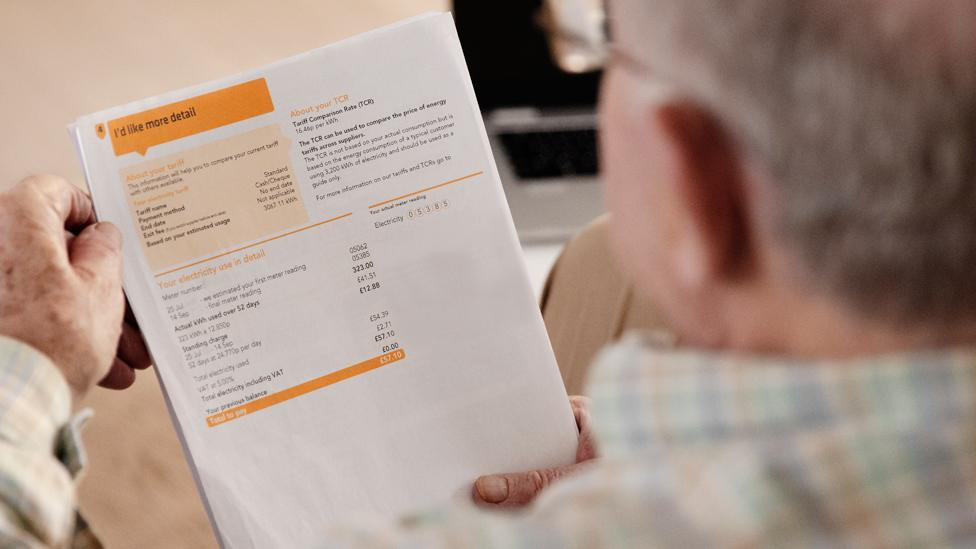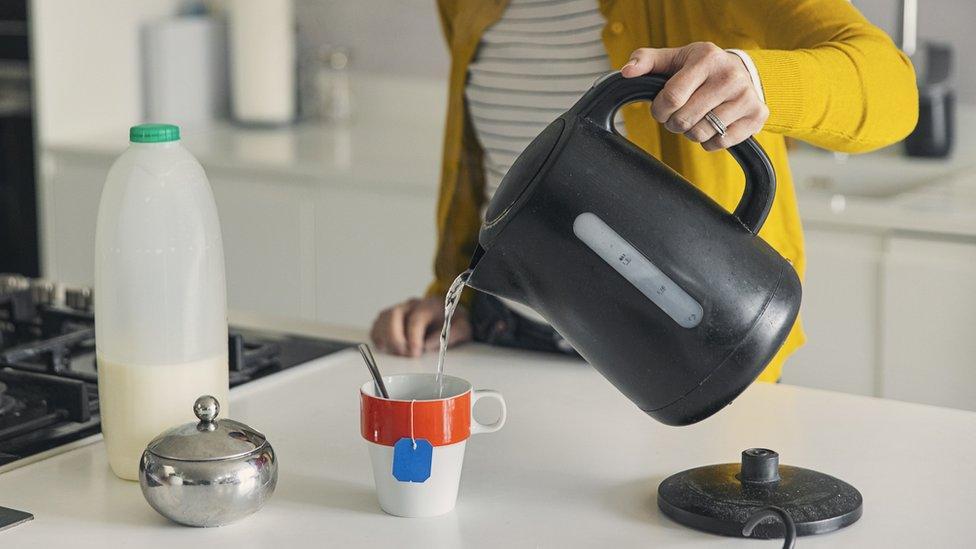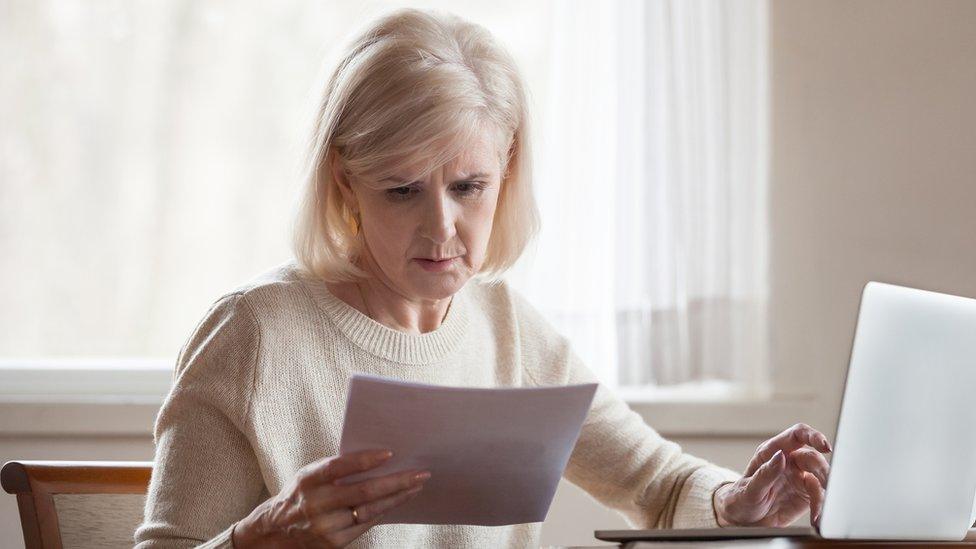Cost of living: Chancellor to meet Stormont ministers over energy discount
- Published

Chancellor Nadhim Zahawi is expected to meet Stormont ministers on Wednesday to discuss how a £400 energy discount can be applied in Northern Ireland.
It comes after a children's doctor said she feared what the winter would bring amid cost-of-living pressures.
In May, the government drew up plans to help all households in the UK with rising fuel bills.
But the lack of a functioning executive meant it was unclear how the scheme would reach Northern Ireland.
While discussions continue, it is understood an announcement is not likely this week.
Mr Zahawi said he was aware that families in Northern Ireland are feeling anxious about rising costs.
In a statement on Tuesday night, he said the government was absolutely committed to helping households in Northern Ireland with their fuel bills.
"I know families across Northern Ireland are feeling anxious about rising costs and the UK government has stepped in to ease pressures on household budgets," he said.
"We delivered an unprecedented level of support in July with a national insurance cut that will put £330 back into workers' pockets this year, while many of Northern Ireland's most vulnerable households have already received the first instalment of a £650 Cost of Living Payment.
"And there's more to come. Not only will the second instalment of that payment arrive this autumn, but I've been clear that we are absolutely committed to bringing an equivalent to the £400 energy bills discount to Northern Ireland as soon as possible to ease the burden on families."
The UK Treasury would have ordinarily made the payment via a Barnett Consequential to Northern Ireland, as it had previously done with a £200 energy loan payment scheme.
It uses the Barnett formula to calculate additional funding when there are changes to UK government spending that affect devolved services.
However, the Treasury said without a functioning government at Stormont to sign off on the money, it was considering other ways of applying the discount.
It is understood that Stormont's Department for the Economy holds a legal power under the Electricity (Northern Ireland) Order 1992, to direct electricity providers in Northern Ireland to make the payment to consumers.
This is being looked at by officials as a possible solution, in line with how the discount is being applied in Great Britain from October.

Communities Minister Deirdre Hargey said a solution needed to be found quickly
However, it is believed Northern Ireland's Utility Regulator, which is responsible for regulating the local energy industries, could have to undertake a public consultation first.
BBC News NI understands legal advice is being sought to assess if this could be bypassed, to ensure payments can be made more quickly to households.
Mr Zahawi is also expected to hold talks with John French, the utility regulator's chief executive, about the issue.
Communities Minister, Sinn Fein's Deirdre Hargey, said she would tell Mr Zahawi in her meeting with him that a solution needed to be found "quickly".
"The quickest solution here is to have a functional government, but in the absence of that we're having to find work-arounds," she said.
"The reality of that is we can see those work-arounds take time... we need to do all we can to work with the Treasury, in the absence of others who are unwilling to come in and form a government."
Stormont has been without a power-sharing executive since February, due to the DUP's ongoing protest against the Northern Ireland Protocol.
The party is refusing to nominate a deputy first minister until the post-Brexit trading arrangements are changed, meaning a decision-making executive cannot be formed and the legislative assembly cannot operate.
Other ministers can remain in post, but they are unable to take major policy decisions.

Gregory Campbell rejected claims the party's refusal to enter power sharing was making the issue harder to solve
DUP MP Gregory Campbell said the government had announced the energy scheme and it was responsible for ensuring people in Northern Ireland benefited from it.
"The chancellor needs to get a pathway, announce it and get the money into people's pockets," he said.
He rejected claims that the DUP's refusal to re-enter power sharing was making it harder to solve the issue.
"Each of the ministers can get on with their jobs, we want the relevant Westminster department to now do likewise and deliver for hard-pressed families in Northern Ireland," he added.
In Great Britain, the first of six instalments of the discount will be applied to households' energy bills in October.
All customers with a domestic electricity meter who pay by direct debit, either monthly or quarterly, or by card will see an automatic deduction off their bills.
Those with "smart" prepayment devices will see an automatic monthly top-up added to their account, meaning they will have to add less credit to their meter for the total energy they use.
Poverty 'obliterates' children's futures
Earlier this year, the Joseph Rowntree Foundation (JRF) said about one in four children in Northern Ireland are living in poverty.
Dr Julie-Ann Maney, a consultant at the Royal Belfast Hospital for Sick Children, said tackling the issue of poverty needed to be a political priority.
"Children don't really have a voice, so it's up to us as advocates to speak for them and say that this cannot continue, we can't have our children - 26% currently - living in poverty," she told Radio Ulster's Talkback programme.
"Poverty obliterates their future really, I can make choices for my children because I am in the position to do that, but for poor children those choices just aren't there.
"Most of those families are working families, most of those families are people who have good jobs, but the way the economy is set up they can't cope, they can't meet their basic needs."
Dr Maney said other countries, like Scotland, had taken steps to help children living in poverty.
These measures include a weekly £20 payment to assist with living costs and childcare.
"Unfortunately, we don't have an executive at the minute to make those choices and say enough is enough," she said.
"They're not really doing anything about it. We've been waiting for a strategy which child poverty would be a part of."
Dr Maney said that Northern Ireland had the highest infant-mortality rate in the UK and therefore one of the highest in western Europe.
"Our children's health is getting worse and we are bracing ourselves in the children's hospital, in the Royal, for lots of illness over the winter period," she said
"We are praying for a mild winter so that we don't see babies dying because they're so cold and their parents can't afford to put the heat on because oil prices and gas prices are so high."
- Published10 August 2022

- Published29 July 2022

- Published22 July 2022

- Published26 May 2022

